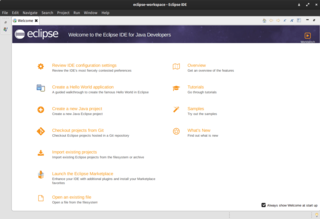An integrated development environment (IDE) is a software application that provides comprehensive facilities for software development. An IDE normally consists of at least a source-code editor, build automation tools, and a debugger. Some IDEs, such as NetBeans and Eclipse, contain the necessary compiler, interpreter, or both; others, such as SharpDevelop and Lazarus, do not.

Eclipse is an integrated development environment (IDE) used in computer programming. It contains a base workspace and an extensible plug-in system for customizing the environment. It is the second-most-popular IDE for Java development, and, until 2016, was the most popular. Eclipse is written mostly in Java and its primary use is for developing Java applications, but it may also be used to develop applications in other programming languages via plug-ins, including Ada, ABAP, C, C++, C#, Clojure, COBOL, D, Erlang, Fortran, Groovy, Haskell, JavaScript, Julia, Lasso, Lua, NATURAL, Perl, PHP, Prolog, Python, R, Ruby, Rust, Scala, and Scheme. It can also be used to develop documents with LaTeX and packages for the software Mathematica. Development environments include the Eclipse Java development tools (JDT) for Java and Scala, Eclipse CDT for C/C++, and Eclipse PDT for PHP, among others.
Borland Kylix is a compiler and integrated development environment (IDE) formerly sold by Borland, but later discontinued. It is a Linux software development environment based on Borland Delphi and Borland C++ Builder, which runs under Microsoft Windows. Continuing Delphi's classical Greek theme, Kylix is the name for an ancient Greek drinking cup. The closest supported equivalent to Kylix is the free Lazarus IDE package, designed to be code-compatible with Delphi. As of 2010 the project has been resurrected in the form of Delphi cross compiler for Mac and Linux, as shown in the Embarcadero's Delphi and C++ Builder roadmap. As of September 2011 with Kylix discontinued the framework for cross-platform development by Embarcadero is FireMonkey.

SharpDevelop is a discontinued free and open source integrated development environment (IDE) for the .NET Framework, Mono, Gtk# and Glade# platforms. It supports development in C#, Visual Basic .NET, Boo, F#, IronPython and IronRuby programming languages.

Komodo Edit is a free and open source text editor for dynamic programming languages. It was introduced in January 2007 to complement ActiveState's commercial Komodo IDE. As of version 4.3, Komodo Edit is built atop the Open Komodo project. Komodo IDE is no longer supported and maintained by developers for Python.

Google Web Toolkit, or GWT Web Toolkit, is an open-source set of tools that allows web developers to create and maintain JavaScript front-end applications in Java. It is licensed under Apache License 2.0.
Google Developers is Google's site for software development tools and platforms, application programming interfaces (APIs), and technical resources. The site contains documentation on using Google developer tools and APIs—including discussion groups and blogs for developers using Google's developer products.

Aptana, Inc. is a company that makes web application development tools for use with a variety of programming languages. Aptana's main products include Aptana Studio, Aptana Cloud and Aptana Jaxer.
The following tables list notable software packages that are nominal IDEs; standalone tools such as source-code editors and GUI builders are not included. These IDEs are listed in alphabetic order of the supported language.
Carbide.c++ is a software development tool for C++ development on Symbian OS. It is used to develop phones that use the OS, as well as applications that run on those phones. It is based on the Eclipse IDE platform enhanced with extra plug-ins to support Symbian OS development. The product is provided by the Symbian Foundation under an open source model. In April 2009, Nokia transferred Carbide.c++ and many other software developer tools to the Symbian Foundation. Members of the Symbian community now manage and contribute code to the Carbide.c++ product.

PyDev is a third-party plug-in for Eclipse. It is an Integrated Development Environment (IDE) used for programming in Python supporting code refactoring, graphical debugging, code analysis among other features.
Web2py is an open-source web application framework written in the Python programming language. Web2py allows web developers to program dynamic web content using Python. Web2py is designed to help reduce tedious web development tasks, such as developing web forms from scratch, although a web developer may build a form from scratch if required.
The SAP NetWeaver Developer Studio (NWDS) is an integrated development environment (IDE) for most of the Java part of SAP technology, mainly building business web applications, but also creating SAP Enterprise Portal projects and SAP Interactive Forms by Adobe. The official abbreviation Developer Studio is used seldom whereas NWDS is common, but unofficial.

RhoMobile Suite, based on the Rhodes open source framework, is a set of development tools for creating data-centric, cross-platform, native mobile consumer and enterprise applications. It allows developers to build native mobile apps using web technologies, such as CSS3, HTML5, JavaScript and Ruby. Developers can deploy RhoMobile Suite to write an app once and run it on the most-used operating systems, including iOS, Android, Windows Phone, Windows Mobile, Windows CE, Windows 10 Mobile and Windows Desktop. Developers control how apps behave on different devices. RhoMobile Suite consists of a set of tools for building, testing, debugging, integrating, deploying and managing consumer and enterprise apps. It consists of the products Rhodes, RhoElements, RhoStudio, RhoConnect, and RhoGallery, and includes a built-in Model View Controller pattern, an Object Relational Mapper for data intensive apps, integrated data synchronization, and a broad API set. These mobile development services are offered in the cloud and include hosted build, synchronization and application management.
DLTK (Dynamic Languages Toolkit) — is a tool for vendors, researchers, and end-users who rely on dynamic languages. DLTK is a set of extensible frameworks designed to reduce the complexity of building full featured development environments for dynamic languages such as PHP and Perl. Besides a set of frameworks DLTK provides exemplary Tcl, Ruby, Javascript and Python development environments.

Nodeclipse is a set of third-party developer solutions for Eclipse for programming in JavaScript, CoffeeScript with focus on Node.js.







